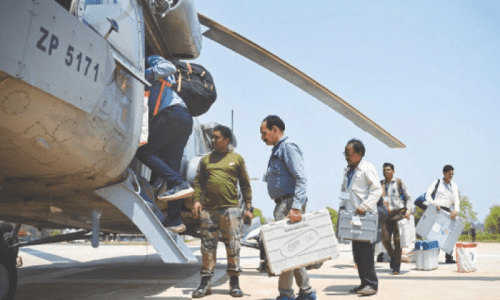NEW DELHI: Amid optimism and concerns for its fragile democracy, India will hold its pivotal national elections on Friday.
The nation’s most right-wing prime minister, Narendra Modi, is attempting to win a third term in a row, something that hasn’t happened since Jawaharlal Nehru, but his resurgent opponents warn he might lose.
Mr. Modi asserts his confidence in securing over 400 seats in the 18th Lok Sabha, which would give him a commanding majority in the lower house’s 545 seats—a feat that Rajiv Gandhi has only once accomplished.
The Bharatiya Janata Party intends to gain additional members of the ruling National Democratic Alliance (NDA) to bring its total to 370, up from 303. There is a widespread concern that Mr. Modi would try to utilize the majority to amend the constitution to suit his vision of Hindustan.
The opposition perceives a gap in the PM’s strength in the north, and Modi declares his confidence in securing over 400 seats in the Lok Sabha.
The Congress and regional parties that had previously been Mr. Modi’s bitter opponents have united to form the India National Development Inclusive Alliance (INDIA) grouping. Because of its “whimsical policies, narcissistic hegemony, communal avowal as well as violence against the minorities and the fear factor against any dissent,” they are advocating for the NDA’s ouster from office.
Although it’s early, reports from the ground indicate that there isn’t a Modi wave visible anywhere in the nation. The largest number of seats, representing 102 races across 21 states, will be up for grabs on Friday. These will be the longest elections in history due to the remaining six polling stages, which include the final leg on June 1. The justification is security, entailing the periodic deployment of 3.4 lakh paramilitary personnel.
All seven stages of polling would take place in West Bengal, where the Bharatiya Janata Party hopes to gain more seats than the 18 of 42 seats it won in the previous election. There will probably be up to 92,000 security guards stationed there.
In 2014, the BJP held just two seats in the state.
The Ram Mandir, the repeal of Article 370 in Jammu and Kashmir, and the purported Modi magic are the main bets made by the NDA. Each and every BJP leader is promoting Hindutva, which marginalizes Muslims. The BJP’s platform, dubbed “Modi ki Guarantee,” enumerates the policies of a ten-year government. “We promise you greater freedom, faster growth, more equitable development, and justice for all,” is the Congress’s pledge of 10 forms of justice, and it still has resonance today.
But the numbers are where the problem lies. With 39% of the vote, Mr. Modi won 55% of the seats in 2019. By splitting the 61 per cent of votes cast for non-BJP parties, he clearly prevailed in doing so.
The opposition must come together where it counts because it sees an opportunity here. The question is how Mr. Modi will locate an additional 67 opposition seats without giving up any of his own to meet the BJP’s target of 370 seats without the support of any allies.
The opposition perceives a gap in Mr. Modi’s support base in the north. Since he won every seat in Delhi, every seat in Haryana, every seat in Rajasthan, every seat in Maharashtra, every seat in Madhya Pradesh, every seat in Gujarat, every seat in Uttar Pradesh, every seat in Bihar, every seat in Uttarakhand, every seat in Himachal Pradesh, and every seat in 62 of 80 in Uttar Pradesh, a lot has changed.
That gives the BJP a total of 213 seats from its bastion in the north. In other areas, the BJP secured 25 out of 28 seats in Karnataka, 8 out of 21 seats in Odisha, and 4 out of 17 seats in Telangana. Out of 25 seats, the BJP secured two in Andhra Pradesh. It’s saturated in the north, and chances are it might only get worse from there if a contentious topic doesn’t surface.
Following the most recent elections, the Congress has taken control of Karnataka, Telangana, and Himachal Pradesh. In Andhra Pradesh, where it has forged an alliance with the Telugu Desam, the BJP could see an increase in its vote total. But some really wild guesses have been made. The Modi alliance may only receive 180 seats, over a hundred fewer than a majority, according to Rahul Gandhi.
Uadhav Thackeray of the Shiv Sena, on whose support the BJP won handily in Maharashtra, feels a little resentful that the BJP will only win 45 seats. Additionally, the West Bengal Trinamool Congress claims it would win twice as many seats as the BJP in the state, which should worry followers of Mr. Modi.
The Modi souffle has so far failed to rise again following the communal polarization of Muzaffarnagar in 2014 and the nationalist fervor that propelled his campaign in Pulwama-Balakot in 2019.








